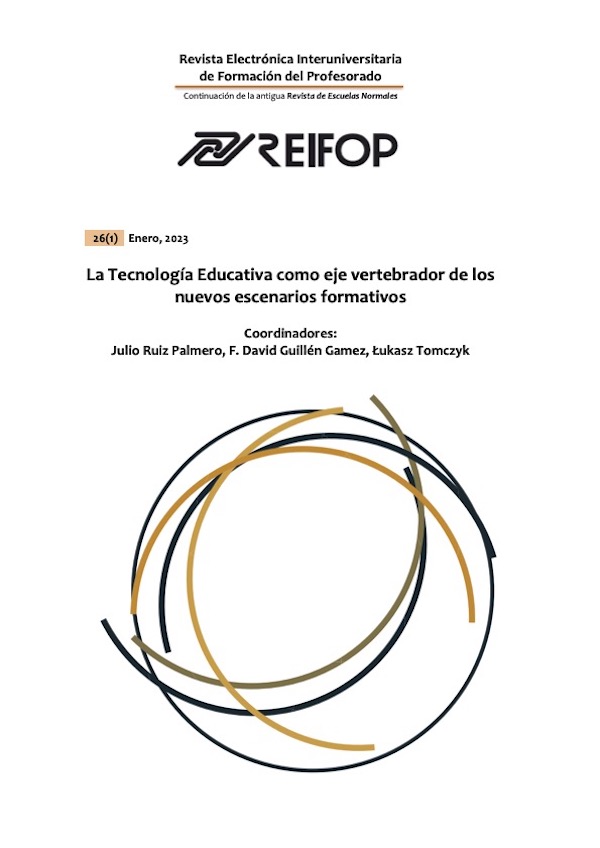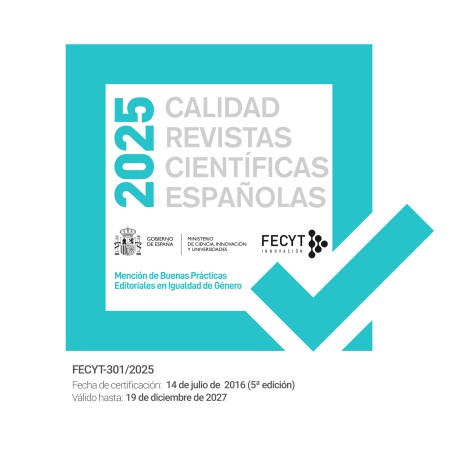Apoyo a la inclusión educativa del alumnado con Trastornos del Espectro Autista: un estudio preliminar de asistentes personales
Resumen
El estudio que se presenta tiene como propósito explorar las funciones y prácticas de asistentes de aula que intervienen en el aula con alumnado que presenta Trastorno del Espectro Autista (TEA), conocidos comúnmente en Andalucía como “Maestros sombras” (MS). Estos profesionales persiguen favorecer el acceso y la permanencia en sus entornos ordinarios de aprendizaje en centros educativos de educación Primaria de la provincia de Málaga (España). El enfoque metodológico ha sido cualitativo. Se ha recogido información mediante entrevistas semi-estructuradas, analizándola con un sistema de categorías y códigos inductivos a través del programa de análisis de datos Atlas.ti 9. Los resultados muestran la diversidad de funciones y tareas que realizan, especialmente en materia de gestión de rutinas, así como en la regulación emocional y conductual en el aula. Se desprende como conclusión la necesidad de regular y discutir esta figura emergente para la atención a la diversidad para estudiantes con necesidad de apoyo extenso
Descargas
-
Resumen4799
-
PDF2891
Citas
Angelides, P.; Constantinou, C. & Leighm, J. (2009) The role of paraprofessionals in developing inclusive education in Cyprus, European Journal of Special Needs Education, 24, (1) 75-89. http://dx.doi.org/10.1080/08856250802596741.
Azad, G. F.; Locke J.; Downey, M. M.; Xie, M. & Mandell, D. S. (2015) One-to-One Assistant Engagement in Autism Support Classrooms. Teach Educ Spec Educ, 38 (4) 337-346. 10.1177/0888406415603208
Arnaiz, P. y Escarbajal, A. (Eds.) (2020). Aulas abiertas a la inclusión. Dykinson
Bardin, L. (1986). Análisis de contenido. Madrid: Akal.
Bedoin, D. & Janner-Raimondi, M. (2016) Rôles de l’auxiliaire de vie scolaire auprès de jeunes enfants en situation de handicap. Spirale. Revue de recherches en éducation, 57, 67-80
Biggs, E. E.; Gilson, C. B; & Carter, E W. (2018) “Developing That Balance” Preparing and Supporting Special Education Teachers to Work with Paraprofessionals. Teacher education and Special Education, 42(2), 117-131. https://doi.org/10.1177/0888406418765611
Bitterman, A.; Daley, T. C.; Misra, S.; Carlson, E. & Markowitz J. (2008). A national sample of preschoolers with autism spectrum disorders: Special education services and parent satisfaction. Journal of autism and developmental disorders, 38(8), 150–151. http://dx.doi.org/10.1007/s10803-007-0531-9
Broer, S. M.; Doyle, M. B. & Giangreco, M.F. (2007). Perspectives of students with intellectual disabilities about their experiences with paraprofessional support. Exceptional Children, 71(4) 415-430.
Carty, A.; & Farrell, A. (2018). Co-teaching in a mainstream post-primary mathematics classroom: an evaluation of models of co-teaching from the perspective of the teachers. Support for learning 33(2), 101- 121 https://doi.org/10.1111/1467-9604.12198
Chiri, G. & Warfield, M. E. (2012). Unmet need and problems accessing core health care services for children with autism spectrum disorder. Maternal and child health journal, 16(5) 1081–1091. 10.1007/s10995-011-0833-6
Cohen, L.; Manion, L. & Morrison, K. (2000). Research methods in education. London, UK: Routledge/Falmer.
Goodall, C. (2018) I felt closed in and like I couldn’t breathe’: A qualitative study exploring the mainstream educational experiences of autistic young people. Autism & Developmental Language Impairments, 3, 1–16. 10.1177/2396941518804407
Douglas, S. N.; Uitto, D., J.; Reinfelds, C L; & D'Agostino, S. (2018) A Systematic Review of Paraprofessional Training Materials. The Journal of Special Education, 52(4), 195-207. https://doi.org/10.1177/0022466918771707
Downing, J. E.; Ryndak, D. L. & Clark D. (2000) Paraeducators in inclusive classrooms: Their own perceptions. Remedial and Special Education, 21, 171–18. https://doi.org/10.1177/074193250002100308
Falkmer, M., Anderson K., Joosten A., &Falkmer, T. (2015). Parents ́ Perspectives on Inclusive Schools for Children with Autism Spectrum Conditions. International Journal of Disability, Development and Education,62(1), 1–23.
Fisher M. & Pleasants S. L. (2012) Roles, responsibilities, and concerns of paraeducators: Findings from a statewide survey. Remedial and Special Education, 33 (5) 287–297
Giangreco M. F. & Broer S. M. & Edelman S. W. (2001) Teacher engagement with students with disabilities: Differences based on para-professional service delivery models. Journal of the Association for Persons with Severe Handicaps, 26 ,75–86. https://doi.org/10.2511/rpsd.26.2.75
Giangreco, M. F. (2010). One-to-one Paraprofessionals for Students with Disabilities in Inclusive Classrooms: Is Conventional Wisdom Wrong? Intellectual and Developmental Disabilities, 48 (1), 1−13. https://doi.org/10.1352/1934-9556-48.1.1
Giangreco, M. F. & Doyle, M. B. (2007). Teacher Assistants in Inclusive Schools. In L. Florian (Ed.), The SAGE Handbook of Special Education. 429−439. London: Sage.
Glasser, B. & Strauss, A. (1999). The discovery of grounded theory: Strategies for qualitative research. New York: Aldine de Gruytery
Gómez-Zepeda, G.; Petreñas, C.; Sabando, D. & Puigdellívol, I. (2017), The role of the Support and Attention to Diversity Teacher (SADT) from a community-based perspective: Promoting educational success and educational inclusion for all, Teaching and Teacher Education, 64, 127- 138. https://doi.org/10.1016/j.tate.2017.02.002
Johnson, T. M. & King-Sears, M. E. (2020) Eliciting Students´Perspectives About their Co-teaching Experiences. Intervention in School and Clinic, 56 (1), 51-55. https://doi.org/10.1177/1053451220910732
Junta de Andalucía (2018) Convenio de colaboración entre la consejería de educación de la Junta de Andalucía y la Federación Autismo Andalucía para favorecer la atención educativa al alumnado con trastornos del espectro del autismo.
Kheroufi-Andriot, O. (2019) Le processus d’exclusion / inclusion des enfants en situation de handicap à l’école. McGill Journal of Education, 54 (2), 369–387. https://doi.org/10.7202/1065663ar adresse copiéeune erreur s'est
Krippendorff, K. (2002). Metodología de análisis de contenido. Teoría y práctica. Barcelona: Paidós
Ley Orgánica 3/2020, de 29 de diciembre, por la que se modifica la Ley Orgánica 2/2006, de 3 de mayo, de Educación.
Larcombe TJ, Joosten AV, Cordier R, Vaz S. (2019) Preparing Children with Autism for Transition to Mainstream School and Perspectives on Supporting Positive School Experiences. J Autism Dev Disord. 49 (8):3073-3088. doi: 10.1007/s10803-019-04022-z. PMID: 31041629.
Lindsay, S., Proulx, M., Thomson, N., & Scott, H. (2013). Educators’ challenges of including children with autism spectrum disorder in mainstream classrooms. International Journal of Disability, Development and Education, 60, 347–362. https://doi.org/10.1080/1034912X.2013.846470
Lozano-Martínez, J. L., Cava, A., Minutoli, G., & Reche, I. S. C. (2021). ¿ Es necesaria la formación del profesorado en metodologías inclusivas?: Un estudio en centros de Messina. Revista electrónica interuniversitaria de formación del profesorado, 24(2) https://doi.org/10.6018/reifop.468941
Martin, T. & Alborz A. (2014) Supporting the education of pupils with profound intellectual and multiple disabilities: The views of teaching assistants regarding their own learning and development needs. British Journal of Special Education, 41 309–327. https://doi.org/10.1111/1467-8578.12070
Miles, M. & Huberman, A. M. (1994). Qualitative data analysims. Thousand Oaks, CA: Sage Publications.
Morales- Mayer, P. C.; Lossi, M. A.; Reinaldo, A.; Meire, R. & Zilly, A. (2019). Professor auxiliar e a inclusão de alunos com Transtorno do Espectro Autista. Revista Educação Especial, 32. Extraído de: https://periodicos.ufsm.br/educacaoespecial/article/view/33028/html
Moriña, A., Márquez, C. &Álvarez, E.(2020). Redes Personales de Estudiantes con Discapacidad en la Universidad. Revista Electrónica Interuniversitaria de Formación del Profesorado, 23(2), 209-‐224. https://doi.org/10.6018/reifop.410261
Picchio, F. (2017) D’une transition à l’autre: les auxiliaires de vie scolaire. Initio, 6, 137-154. ⟨hal-02969922⟩
Pellecchia, M.; Connell J. E.; Kerns, C. M.; Xie, M.; Marcus, S. C. & Mandell, D. S. (2016). Child characteristics associated with outcome for children with autism in a school-based behavioral intervention. Autism, 20(3), 321–329. 10.1177/1362361315577518
Pla-Campas, G., Simó-Gil, N. & Arumí-Prat, J. (2022). Análisis de los efectos de un proyecto innovador de codocencia en la universidad. Revista Electrónica Interuniversitaria de Formación del Profesorado, 25(1), 93-104 https://doi.org/10.6018/reifop.499111
Polo-Márquez, E. (s/f) La construcción de la identidad pedagógica y perfil profesional de los MS en la atención a la diversidad. Un estudio de educación inclusiva. Universidad de Málaga (Tesis doctoral en proceso).
Reddy, L. A; Lekwa, A. & Glover, T. A. (2020) Supporting paraprofessionals in schools: Current research and practice. Psychol School, 1-5. https://doi.org/10.1002/pits.22457
Rexroat-Frazier, N. & Chamberlin, S. (2018) Best practices in co-teaching mathematics with special needs students. Journal of Research in Special Educational Needs, 10.1111/1471-3802.12439
Riggs, C. & Mueller P. H. (2001) Employment and utilization of paraeducators in inclusive settings. The Journal of Special Education, 35, 54–62. https://doi.org/10.1177/002246690103500106
Ribeiro de Paulo, R.; Vera L. & Rita de Fátima, S. (2016) O papel do auxiliar Pedagógico especializado na incluso do autista. Revista Diálogos Interdisciplinares - GEPFIP, 1 (3), 50-65.
Rousseau, N.; Point, M.; Vienneau, R.; Desmarais, M. É. & Desmarais, K. (2017). Les apportset les limites liés aux pratiques inclusives et la place de la collaboration dans ces pratiques: unemétasynthèse. Revue suisse des sciences de l’éducation, 39 (1), 21-40. ISSNN: 1424-3946
Sapon-Shevin, M. (2013) La inclusión real: Una perspectiva de justicia social. Revista de Investigación en Educación, 11 (3), 71-85.
Symes, W. & Humphrey, N. (2011) Peer-group indicators of social inclusion among pupils with autistic spectrum disorders (ASD) in mainstream secondary schools: A comparative study. School Psychology International, 31 (5), 478– 94.
Strauss, A. & Corbin, J. (1998). Bases de la investigación cualitativa: técnicas y procedimientos para desarrollar la teoría fundamentada. Medellín: EUA.
Strogilos, V. & Avramidis, E. (2016). Teaching experiences of students with special educational needs in co-taught and non-co-taught clases. Journal of Research in Special Educational Needs, 16 (1), 24–33 10.1111/1471-3802.12052
Takala, M. (2007). The work of classroom assistants in special and mainstream education in Finland. British Journal of Special Education, 34 (1), 50-57. 10.1111/j.1467-8578.2007.00453.x
Tójar, J. C. (2006). La investigación cualitativa. Comprender y actuar. Madrid: La Muralla.
UNESCO (2020). A guide for ensuring inclusion and equity in education. París: UNESCO
Verger, S.; Chover, L. & Rosselló, M. R. (2020) La contribución del/del auxiliar técnico educativo (ATE) para el desarrollo de una plena inclusión. Aula abierta, 49 (2),171-179. 10.17811
Walker, V. L.; Carpenter, M. E.; Lyion, K. & Button, L. (2021) A Meta-Analysis of Paraprofessional-Delivered Interventions to Address Challenging Behavior Among Students with Disabilities. Journal of Positive Behavior Interventions, 23 (2), 68-80. 10.1177/1098300720911147
Walker, V. L.; Douglas, K. H; Douglas S. N. & D´Angostino S. R. (2020) Paraprofessional-implemented systematic instruction for students withdisabilities: A systematic literatura review. Education and Training in Autism and Developmental Disabilities, 55 (3), 303–317
Walker, V. L.; Grygas Cool C.; Lyon, K. & Turf, M. (2020) A meta-analytic review of paraprofessional-implemented interventions for students with autism spectrum disorder. Psychology in the Schools, 58 (4), 686–701.https://doi.org/10.1002/pits.22380
Walker, V.L.; Kurth, J.; Carpenter, M. E.; Tapp, M. C.; Clausen, A. & Lockman T. E. (2021) Paraeducator- Delivered Intervention for student with Extensive Support Needs in Inclusive School Setting: A systematic Review. Research and practice for persons with severe disabilities, 46 (4). 10.1177/15407969211055127
World Medical Association. (2009). Declaration of Helsinki. Ethical principles for medical research involving human subjects. Jahrbuch für Wissenschaft Und Ethik, 14 (1), 233-238.
Los artículos que se publican en esta revista están sujetos a los siguientes términos:
1. El Departamento de Métodos de Investigación y Diagnóstico en Educación de la Universidad de Murcia (España), junto con el Servicio de Publicaciones de la Universitdad de Murcia (Editum) son los editores de la revista REIFOP y conserva los derechos patrimoniales (copyright) de los artículos publicados, permitiendo la reutilización de las mismos bajo la licencia de uso indicada en el punto 2.
2. Las obras se publican en la edición electrónica de la revista bajo una licencia Creative Commons Reconocimiento-NoComercial-SinObraDerivada 3.0 España (texto legal). Se pueden copiar, usar, difundir, transmitir y exponer públicamente, siempre que: i) se cite la autoría y la fuente original de su publicación (revista, editores y URL de la obra); ii) no se usen para fines comerciales; iii) se mencione la existencia y especificaciones de esta licencia de uso.
3. Condiciones de auto-archivo. Se permite y se anima a los autores a difundir electrónicamente las versiones pre-print (versión antes de ser evaluada) y/o post-print (versión evaluada y aceptada para su publicación) de sus obras antes de su publicación, ya que favorece su circulación y difusión más temprana y con ello un posible aumento en su citación y alcance entre la comunidad académica. Color RoMEO: verde.
















